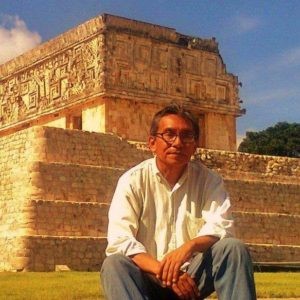These pandemic days, as tricky as they are, teach us many things, reveal a part of ourselves, and make us reflect in many ways. One of them, however contradictory or incredible it may seem to us, is history.
Now, think about our life. Our lives, both in the personal, the particular, in the social and the communal way.
And this type of historical thinking, personal and collective, we can convert into a mental exercise that allows us to approach other moments, other places, and stages of the development of humanity.
One of those times, is during “the collapse,” the moment when the Maya civilization began to decline, which has been mistakenly called the “disappearance” of the Maya.
These days of fear and uncertainty can give us some idea of those same emotions that the ancient Maya experienced during their collapse. Increased of course, by the magical thinking that all the pre-Columbian society had, acompanied by the ignorance to which almost all the population was subjected.
The only ones who had the scientific and artistic knowledge, were the members of the political and clerical elites. Only they had the knowledge of astronomy, mathematics, calendars, writing, architecture, medicine and more.
Science served them to show themselves powerful in front of everyone else, it served them to manipulate the population, instill and increase fear in them, and pretend to be sacred: sons or envoys of the gods, or even gods themselves, thus reinforcing the magical ideas and fear in all people, and stay in power.
In the 9th century AD, a series of adverse events: droughts, earthquakes in seismic areas, hurricanes, famines, diseases, wars, were occurring, the development of this civilization, acquired a dramatic character. The population, not having a solution from the rulers and priests, became strongly discontent. Uprisings, revolutions and riots came knocking down the big cities, and like that, one by one the Maya kingdoms fell.
The fear that we can now experience in the face of the coronavirus pandemic could give us an idea of the panic, the desperation, and anger that the Maya population would have experienced in the face of the catastrophes that they were experiencing and the lack of response, the lack of help from those who in practice were the masters of their lives.
Therefore, the ruling and priestly classes were violently eliminated in the ancient Maya kingdoms. The new leaders and perhaps the survivors of the extermination of these elites, took the reins of the diminished kingdoms, and in this situation of fracture of the old Maya political system, a social group that had never been in power: the merchants, occupied an important throne: Chichen Itza.
Today, when fortunately we are not at those terrible levels of magical thinking, although ignorance is still a great enemy to be overcome, science is widespread, the world is interconnected in real-time, and new technology inscribes us in a new type of life, emotions that could seem old, or even overcome, are now shown to us with all their strength in practically all the earth: terror, fear of death, the instinct of survival, prevention in the face of danger, solidarity and hope. Why? Because as humans, independently of the time and place where we have lived, in spite of everything, we are called to carry out great feats and beautiful realizations.
For The Yucatan Times
Indalecio Cardeña Vázquez
Merida, Yucatan
March 20, 2020
 Indalecio Cardeña Vázquez. – Anthropologist, researcher and writer.
Indalecio Cardeña Vázquez. – Anthropologist, researcher and writer.
He has collaborated with the “Unidad Yucatán de la Dirección de Culturas Populares”, Instituto Nacional Indigenista and was the director of the Pinacoteca “Juan Gamboa Guzmán” of the INAH.
Among his anthropological works are the iconographic analysis of the colonial sacred art of the Yucatan Peninsula; the symbolisms in the facade of Conquistador Montejo’s house, in Mérida; the Mayan symbolism in the Yucatan Cathedral and the archaeoastronomy among the Mayans.
Professor Cardeña has written several books and articles since the mid 1980’s to this date.


